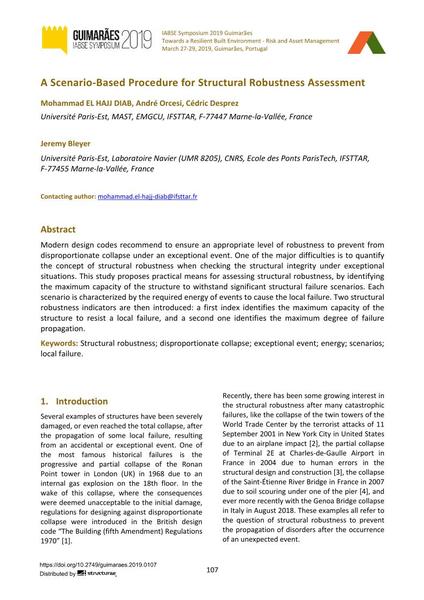A Scenario-Based Procedure for Structural Robustness Assessment

|
|
|||||||||||
Bibliographic Details
| Author(s): |
Mohammad EL Hajj Diab
(Université Paris-Est, MAST, EMGCU, IFSTTAR, F-77447 Marne-la-Vallée, France)
Andre Orcesi (Université Paris-Est, MAST, EMGCU, IFSTTAR, F-77447 Marne-la-Vallée, France) Cédric Desprez (Université Paris-Est, MAST, EMGCU, IFSTTAR, F-77447 Marne-la-Vallée, France) Jeremy Bleyer (Université Paris-Est, Laboratoire Navier (UMR 8205), CNRS, Ecole des Ponts ParisTech, IFSTTAR, F-77455 Marne-la-Vallée, France) |
||||
|---|---|---|---|---|---|
| Medium: | conference paper | ||||
| Language(s): | English | ||||
| Conference: | IABSE Symposium: Towards a Resilient Built Environment Risk and Asset Management, Guimarães, Portugal, 27-29 March 2019 | ||||
| Published in: | IABSE Symposium Guimarães 2019 | ||||
|
|||||
| Page(s): | 107-114 | ||||
| Total no. of pages: | 8 | ||||
| DOI: | 10.2749/guimaraes.2019.0107 | ||||
| Abstract: |
Modern design codes recommend to ensure an appropriate level of robustness to prevent from disproportionate collapse under an exceptional event. One of the major difficulties is to quantify the concept of structural robustness when checking the structural integrity under exceptional situations. This study proposes practical means for assessing structural robustness, by identifying the maximum capacity of the structure to withstand significant structural failure scenarios. Each scenario is characterized by the required energy of events to cause the local failure. Two structural robustness indicators are then introduced: a first index identifies the maximum capacity of the structure to resist a local failure, and a second one identifies the maximum degree of failure propagation. |
||||
| Keywords: |
energy structural robustness disproportionate collapse exceptional event scenarios local failure
|
||||
